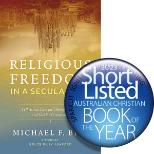 Religious Freedom in a Secular Age
Religious Freedom in a Secular Age
Rev Dr Michael F, Bird
Zondervan, 2022
Reviewed by Bp Michael Stead
Religious Freedom has become a lightning rod of controversy in many Western societies, over whether and how religious freedom needs to be limited in order to protect the rights and freedoms of others, especially the LGBTQI+ community. Bird’s book Religious Freedom in a Secular Age was written largely between 2016 and 2020, at a time when both Australia and the wider world were increasingly embroiled in political conflicts about this, arising from the intersections of religion, government, the public square and personal belief. Bird proposes a way forward that challenges those on the political left who are antagonistic to religion freedom, and those on the political right who seek to weaponise it.
Chapters one and two seek to give a positive argument for secularism, and to distinguish this from militant secularism. Bird argues that secularism is a “post- Christendom political settlement concerned with negotiating space for religious beliefs, diverse beliefs and unbelief in a society no longer dominated by a single homogeneous religious worldview.” (15). Secularism arose out of both the Reformation and the Enlightenment, emerging as the best way to ensure religious freedom in nation states made up of diverse religious adherents living in proximity to each other, set within the framework of fresh philosophies of political rights and freedoms. Bird argues that “secularism with the separation of church and state is a genuinely noble way to carry Christianity forward in a free, democratic and pluralistic environment” (54). Bird contrasts this to militant secularism, which seeks to both to remove religion from the public square and to subject religions to regulation by the state. Secularism is based on state neutrality to religion; militant secularism seeks to neutralise religion
Chapters three, four and five collectively make a positive case for religious freedom. Bird argues that Christians should not pursue a civil religion (such as Christian Nationalism) nor should they accept the imposition of a civic totalism driven by progressive authoritarianism, but instead pursue a confident pluralism. Confident pluralism is Bird’s articulation of classic liberal pluralism, in which individuals and groups have liberty to live and act in according with their own values, and the state should only limit this liberty where necessary to protect the freedoms and rights of others. Freedom of religion is critical in this, because it is the litmus test of overall freedom in society and overall human rights. Bird argues that “the society that ensures the free exercise of religion is more likely to uphold the rights of those who are vulnerable, marginalised, and despised for being ‘other’” (114).
Chapter six and seven propose a strategy for maintaining a Christian witness in a post-Christian society. Bird briefly canvasses other possible responses (political theocracy, living as “Christians in exile”, the “Benedict Option” and “faithful presence”), before articulating his own proposal, “the Thessalonian Strategy”. Bird argues that, like the church in Thessalonica described in Acts 17, we need to turn the world upside down by a counter-cultural living out of the gospel, while holding out a more compelling worldview that Jesus, not Caesar, is Lord. As applied to our modern secular context, “the Thessalonian strategy is a two-pronged approach. First, positively, we must champion confident pluralism as a sociopolitical philosophy, demonstrate community in action, love our neighbours, and live in such a way that those who hate us cannot give a reason for their hatred. Second, negatively, we must challenge the new legal structures being erected around us, expose the hypocrisies and prejudices of those who claim to be committed to tolerance, confront incursions into religious liberty, and disrupt the secular narrative that religion is bad for social fabric.” (131) We should work together in the public square with Christians across the denominational spectrum, and with other faith groups as well. We need to be apologists who defend not only our own beliefs but also the freedom of all faiths by articulating the case for a confident pluralism and advocating for a fair secularism.
This book is a very helpful and eminently readable account of the basis of, and argument for, religious freedom in secular liberal democracies. It is not, and does not seek to be, a work of political theology. Bird’s articulation of the “Thessalonian Strategy” is not the only possible way that Christians could seek to apply biblical principles to respond in the modern secular age, but in my view Bird’s proposal is a good option for our current context. I commend it warmly.
Bishop Dr Michael Stead is the Anglican Bishop of South Sydney and Chair of Freedom for Faith.
